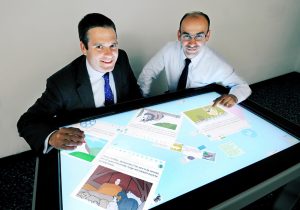Law firm advises on new hi-tech learning platform
26th June, 2013
NEW hi-tech learning is making its way into schools with help from law firm Ward Hadaway.
Intellectual property experts at the UK Top 100 law firm have been advising Newcastle-based Reflective Thinking on its new collaborative learning platform for schools, called Digital Mysteries.
 On reflection – Bill Goodwin from Ward Hadaway (left) with Ahmed Kharrufa of Reflective Thinking looking at the company’s learning software in action.
On reflection – Bill Goodwin from Ward Hadaway (left) with Ahmed Kharrufa of Reflective Thinking looking at the company’s learning software in action.
Digital Mysteries promotes higher-level thinking skills and collaboration between groups of two to four students on PCs with multi-mouse or state-of-the-art tabletop technologies.
The software is for Key Stage 2, 3 and 4 students with fresh content regularly produced by experienced teachers in English, Geography and History.
An Authoring Tool also allows teachers to create their own mysteries and can be used to develop national, local or even school-specific topics.
Ward Hadaway provided a range of legal advice on Digital Mysteries to Reflective Thinking, which is supported by Newcastle University.
Intellectual Property specialist Bill Goodwin advised the company on the ownership and commercialisation of copyright associated with the new learning platform, including agreements with the teachers developing the fresh content for Digital Mysteries.
Bill also advised on the licensing agreements for the software and content and Ward Hadaway provided additional Employment Law advice to Reflective Thinking.
Bill Goodwin said: “Digital Mysteries is an innovative product making use of software and digital content so it was very important to get all the necessary legal agreements in place before it could be launched.
“With the copyright and licensing agreements in place, everyone knew where they stood so the learning platform could be released to the market.
“Reflective Thinking has come up with something that has a whole range of possibilities for boosting pupils’ learning and creative development so it was great to be a small part of helping to bring that to life.”
Digital Mysteries has been inspired by the paper-based Mysteries learning tool, which has been used in schools for several years.
Alongside the educational concepts behind Mysteries, Ahmed Kharrufa – Director of Reflective Thinking – researched technology-enhanced collaborative learning during his PhD at Newcastle University.
Ideas of how to best encourage effective collaboration and higher level thinking evolved through several design cycles with trials carried out in schools in Northumberland, Newcastle and Gateshead.
Ahmed Kharrufa said: “As a technology company, it was crucial that we get the legal and intellectual property aspects right at the very beginning.
“We worked with Bill from Ward Hadaway on many aspects, from advising on trademarks and legal agreements with content creators, to preparing the license agreement to protect our software.
“Even when asking for advice outside their area of expertise, they were a great help in finding us the right guidance.”
Please note that this briefing is designed to be informative, not advisory and represents our understanding of English law and practice as at the date indicated. We would always recommend that you should seek specific guidance on any particular legal issue.
This page may contain links that direct you to third party websites. We have no control over and are not responsible for the content, use by you or availability of those third party websites, for any products or services you buy through those sites or for the treatment of any personal information you provide to the third party.
Topics:

